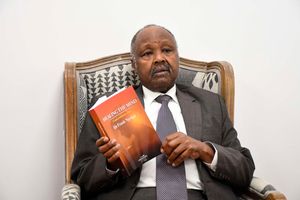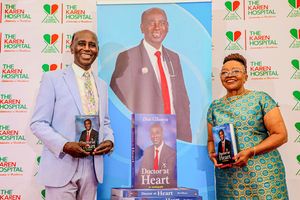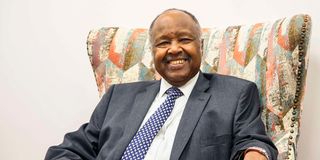
Consultant Psychiatrist and Chairman of Chiromo Hospital Group Dr Frank Njenga, during an interview at his office along Muthangari Road, Lavington on 9, 2025.
Whoever said marrying early is like leaving an overnight party at 7 pm should check with psychiatrist Frank Njenga, who had a wedding while in his second year in university.
The famous “brain doctor” says he has lived a fulfilling life with his wife, describing his 52-year marriage as a “lifelong relationship that has weathered life’s storms”.
In his autobiography -- City Boy, Chronicles of a Nairobi Life — launched in Nairobi on Thursday, Dr Njenga reveals that he first saw his later-to-be wife while on a bus heading to South C. The bus was already full and had started to move from the Gill House stage in Nairobi, but he was too smitten to worry about the 35 cents he had already paid as fare.
In a daring move, he jumped out from a moving bus and ran towards the girl, who was conversing with a young man he knew from his high school days.
“The future had more significant pressure on me. I was ready to lose the bus fare and see what the future would hold,” he writes. “I had to meet the girl with the ‘nice legs’ at all costs.”
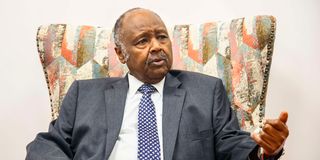
Consultant Psychiatrist and Chairman of Chiromo Hospital Group Dr Frank Njenga, during an interview at his office along Muthangari Road, Lavington on 9, 2025.
The autobiography, packaged in well over 380 pages, is an attempt by Dr Njenga to not only tell his story but also capture Kenya’s history as he witnessed it for the benefit of future generations. It is published by Kenway Publications, an imprint of the East African Educational Publishers.
On his marriage at a young age, he writes that the union came almost abruptly, as he had planned to do so after graduating from the University of Nairobi’s School of Medicine.
“By the end of my second year in medical school, marriage was in the air, and in June 1973, we took our vows. There was no reason to wait for the inevitable. Some say it has been a good marriage, while others argue we were too young to commit and celebrate. What is clear is that my wife and I are still together after years of a moderately good life,” he writes.
Dr Njenga, who was at one point sent abroad by the government to study, is the founder of the Chiromo Hospital Group, a mental health medical institution with five outlets.
His book also gives a glimpse of the dating life in the 1970s, where going to the movies and struggling to honour dates (as there were no mobile phones to cancel plans if something unexpected arose) was the order of the day.
On the day he met her at the Gill House stage, he writes, he scribbled her phone number on a matchbox.
“On March 19, the following year, we watched a movie at Kenya Cinema, ‘Dear John.’ That was our first official date. The great god of love was smiling upon me,” he writes.
Photos in the book indicate that in 1971, the two had a date at the City Mortuary Roundabout, taking turns to photograph each other. Looking plain and with barbed wire in the middle, it makes one wonder why it was in any way attractive for the young lovers.
The two got engaged in July 1972 at the home of Dr Njenga’s parents. That same year, he writes, Elfreda travelled to Zambia to visit her sister.
“I wrote her love letters that have survived to this day,” he writes.
The book also features Dr Njenga’s reflections as he navigates his mid-70s. In a chapter titled “Reflections of Youth in Old Age”, he writes that he his “increasingly aware of my age”.
“My speed on the treadmill has slowed over the years, as has my pace when walking through airports. Most of those at airports are younger, faster, and, in most cases, seem stronger and in a greater hurry than I am,” he writes.
“The word retirement keeps surfacing in conversations, with frequent questions about what I believe I have achieved in this life and concerns about who will ‘take over’ from me as I enter my sunset years. These concerns inevitably raise spiritual and philosophical questions,” he writes.
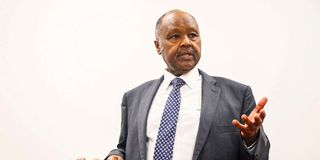
Dr Njenga also tackles historical events such as the Mau Mau rebellion, the State of Emergency, the political realities of postcolonial Kenya, like the Shifta War, the stories of some estates in Nairobi, among others. Reading it, one also gets an idea about the books, films and radio programmes that shaped Dr Njenga’s thinking.
In an interview ahead of the book launch, Dr Njenga said he was motivated to become a psychiatrist after reading the works of French psychiatrist Frantz Fanon.
He writes in his book: “Frantz Fanon’s works set me off on a lifelong journey of discovery into how the mind works. My friend and classmate, Desmond Masilela, lent me ‘The Wretched of the Earth’ [a 1961 book by Fanon], which cleared my vision for the future. Having read it at the age of 16, I decided I would become a psychiatrist when I grew up. That I did not know precisely what this entailed did not stop me from making this promise to myself.”
The book also seeks to challenge the common motif in biographies that those who make it have to rise from pitiable conditions in the villages.
“The mention of an African autobiography often evokes images of a life of want and penury; a childhood sullied by poverty and hopelessness; and the predictable rags-to-riches narrative. Not so for ‘City Boy,’” reads part of the book’s blurb.

